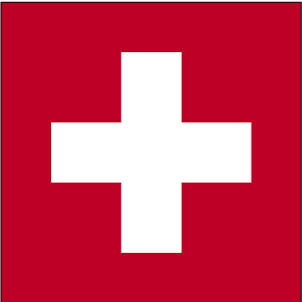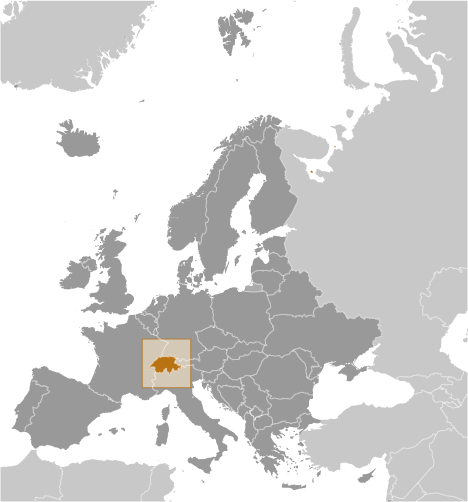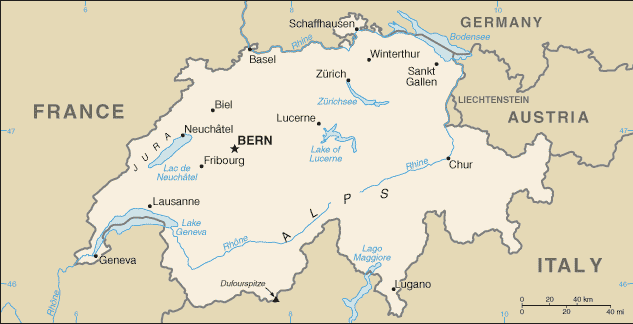|
Country name:
|

|
|
conventional long form: Swiss Confederation
conventional short form:
Switzerland
local long form:
Schweizerische Eidgenossenschaft (German); Confederation Suisse (French); Confederazione Svizzera (Italian); Confederaziun Svizra (Romansh)
local short form:
Schweiz (German); Suisse (French); Svizzera (Italian); Svizra (Romansh)
|
|
|
Government type:
|

|
|
formally a confederation but similar in structure to a federal republic
|
|
|
Capital:
|

|
|
name: Bern
geographic coordinates:
46 55 N, 7 28 E
time difference:
UTC+1 (6 hours ahead of Washington, DC during Standard Time)
daylight saving time:
+1hr, begins last Sunday in March; ends last Sunday in October
|
|
|
Administrative divisions:
|

|
|
26 cantons (cantons, singular - canton in French; cantoni, singular - cantone in Italian; Kantone, singular - Kanton in German); Aargau, Appenzell Ausserrhoden, Appenzell Innerrhoden, Basel-Landschaft, Basel-Stadt, Bern, Fribourg, Geneve, Glarus, Graubuenden, Jura, Luzern, Neuchatel, Nidwalden, Obwalden, Sankt Gallen, Schaffhausen, Schwyz, Solothurn, Thurgau, Ticino, Uri, Valais, Vaud, Zug, Zuerich
note:
6 of the cantons - Appenzell Ausserrhoden, Appenzell Innerrhoden, Basel-Landschaft, Basel-Stadt, Nidwalden, Obwalden - are referred to as half cantons because they elect only one member to the Council of States and, in popular referendums where a majority of popular votes and a majority of cantonal votes are required, these six cantons only have a half vote
|
|
|
Independence:
|

|
|
1 August 1291 (founding of the Swiss Confederation)
|
|
|
National holiday:
|

|
|
Founding of the Swiss Confederation, 1 August (1291)
|
|
|
Constitution:
|

|
|
revision of Constitution of 1874 approved by the Federal Parliament 18 December 1998, adopted by referendum 18 April 1999, officially entered into force 1 January 2000
|
|
|
Legal system:
|

|
|
civil law system; judicial review of legislative acts, except for federal decrees of a general obligatory character
|
|
|
International law organization participation:
|

|
|
accepts compulsory ICJ jurisdiction with reservations; accepts ICCt jurisdiction
|
|
|
Suffrage:
|

|
|
18 years of age; universal
|
|
|
Executive branch:
|

|
|
chief of state: President of the Swiss Confederation Ueli MAURER; Vice President Didier BURKHALTER; note - the Federal Council, which is comprised of seven federal councillors, constitutes the federal government of Switzerland; council members rotate in one-year terms as federal president (chief of state and head of government)
head of government:
President of the Swiss Confederation Ueli MAURER (since 1 January 2013); Vice President Didier BURKHALTER (since 1 January 2013)
cabinet:
Federal Council or Bundesrat (in German), Conseil Federal (in French), Consiglio Federale (in Italian) is elected by the Federal Assembly usually from among its members for a four-year term
(For more information visit the World Leaders website  ) )
elections:
president and vice president elected by the Federal Assembly from among the members of the Federal Council for a one-year term (they may not serve consecutive terms); election last held on 5 December 2012 (next to be held in early December 2013)
election results:
Ueli MAURER elected president; number of Federal Assembly votes - 148 of 202; Didier BURKHALTER elected vice president
|
|
|
Legislative branch:
|

|
|
bicameral Federal Assembly or Bundesversammlung (in German), Assemblee Federale (in French), Assemblea Federale (in Italian) consists of the Council of States or Staenderat (in German), Conseil des Etats (in French), Consiglio degli Stati (in Italian) (46 seats; membership consists of 2 representatives from each canton and 1 from each half canton; members serve four-year terms) and the National Council or Nationalrat (in German), Conseil National (in French), Consiglio Nazionale (in Italian) (200 seats; members elected by popular vote on the basis of proportional representation serve four-year terms)
elections:
Council of States - last held in most cantons on 23 October 2011 (each canton determines when the next election will be held); National Council - last held on 23 October 2011 (next to be held in October 2015)
election results:
Council of States - percent of vote by party - NA; seats by party - CVP 13, FDP 11, SVP 5, SPS 11, other 6; National Council - percent of vote by party - SVP 26.6%, SPS 18.7%, FDP 15.1%, CVP 12.3%, Green Party 8.4%, GLP 5.4%, BDP 5.4%, other 8.1%; seats by party - SVP 54, SPS 46, FDP 30, CVP 28, Green Party 15, GLP 12, BDP 9, other small parties 6
|
|
|
Judicial branch:
|

|
|
Federal Supreme Court (judges elected for six-year terms by the Federal Assembly)
|
|
|
Political parties and leaders:
|

|
|
Christian Democratic People's Party (Christlichdemokratische Volkspartei der Schweiz or CVP, Parti Democrate-Chretien Suisse or PDC, Partito Popolare Democratico Svizzero or PPD, Partida Cristiandemocratica dalla Svizra or PCD) [Christophe DARBELLAY]; Conservative Democratic Party (Buergerlich-Demokratische Partei Schweiz or BDP, Parti Bourgeois Democratique Suisse or PBD, Partito Borghese Democratico Svizzero or PBD, Partido burgais democratica Svizera or PBD) [Martin LANDOLT]; Free Democratic Party or FDP.The Liberals (FDP.Die Liberalen, PLR.Les Liberaux-Radicaux, PLR.I Liberali, Ils Liberals) [Philipp MUELLER]; Green Liberal Party (Grunliberale or GLP, Parti vert liberale or PVL, Partito Verde-Liberale or PVL, Partida Verde Liberale or PVL) [Martin BAEUMLE]; Green Party (Gruene Partei der Schweiz or Gruene, Parti Ecologiste Suisse or Les Verts, Partito Ecologista Svizzero or I Verdi, Partida Ecologica Svizra or La Verda) [Adele THORENS]; Social Democratic Party (Sozialdemokratische Partei der Schweiz or SPS, Parti Socialiste Suisse or PSS, Partito Socialista Svizzero or PSS, Partida Socialdemocratica de la Svizra or PSS) [Christian LEVRAT]; Swiss People's Party (Schweizerische Volkspartei or SVP, Union Democratique du Centre or UDC, Unione Democratica di Centro or UDC, Uniun Democratica dal Center or UDC) [Toni BRUNNER]; and other minor parties
|
|
|
Political pressure groups and leaders:
|

|
|
NA
|
|
|
International organization participation:
|

|
|
ADB (nonregional member), AfDB (nonregional member), Australia Group, BIS, CD, CE, CERN, EAPC, EBRD, EFTA, EITI (implementing country), ESA, FAO, FATF, G-10, IADB, IAEA, IBRD, ICAO, ICC (national committees), ICRM, IDA, IEA, IFAD, IFC, IFRCS, IGAD (partners), ILO, IMF, IMO, IMSO, Interpol, IOC, IOM, IPU, ISO, ITSO, ITU, ITUC (NGOs), LAIA (observer), MIGA, MONUSCO, NEA, NSG, OAS (observer), OECD, OIF, OPCW, OSCE, Paris Club, PCA, PFP, Schengen Convention, UN, UNCTAD, UNESCO, UNHCR, UNIDO, UNITAR, UNMISS, UNRWA, UNTSO, UNWTO, UPU, WCO, WHO, WIPO, WMO, WTO, ZC
|
|
|
Diplomatic representation in the US:
|

|
|
chief of mission: Ambassador Manuel SAGER
chancery:
2900 Cathedral Avenue NW, Washington, DC 20008
telephone:
[1] (202) 745-7900
FAX:
[1] (202) 387-2564
consulate(s) general:
Atlanta, Chicago, Los Angeles, New York, San Francisco
consulate(s):
Boston
|
|
|
Diplomatic representation from the US:
|

|
|
chief of mission: Ambassador Donald S. BEYER, Jr.
embassy:
Sulgeneckstrasse 19, CH-3007 Bern
mailing address:
use embassy street address
telephone:
[41] (031) 357-70-11
FAX:
[41] (031) 357-73-44
|
|
|
Flag description:
|

|
|
red square with a bold, equilateral white cross in the center that does not extend to the edges of the flag; various medieval legends purport to describe the origin of the flag; a white cross used as identification for troops of the Swiss Confederation is first attested at the Battle of Laupen (1339)
|
|
|
National symbol(s):
|

|
|
Swiss cross (white cross on red field; arms equal length)
|
|
|
National anthem:
|

|
|
name: "Schweizerpsalm" [German] "Cantique Suisse" [French] "Salmo svizzero," [Italian] "Psalm svizzer" [Romansch] (Swiss Psalm)
lyrics/music:
Leonhard WIDMER [German], Charles CHATELANAT [French], Camillo VALSANGIACOMO [Italian], and Flurin CAMATHIAS [Romansch]/Alberik ZWYSSIG
note:
unofficially adopted 1961, official adoption 1981; the anthem has been popular in a number of Swiss cantons since its composition (in German) in 1841; translated into the other three official languages of the country (French, Italian, and Romansch), it is official in each of those languages
|
|
|
|
|





 )
)



